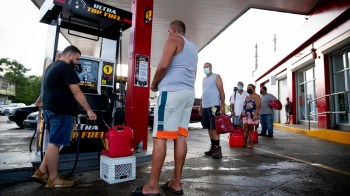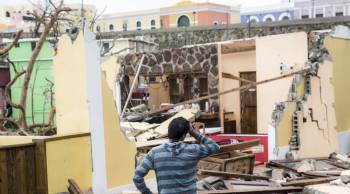U.S. investors could take a hit on Puerto Rican bonds
The tiny island of Puerto Rico, the U.S territory in the Caribbean, is being called “America’s Greece” by some.
Like Greece, Puerto Rico has more debt than it can pay back, upwards of $70 billion, and now it’s asking its creditors for a restructuring of that debt.
Unlike Greece, Puerto Rico isn’t talking about abandoning the dollar, but U.S. investors do stand to take a sizeable hit if the territory defaults on its loan obligations.
Puerto Rico has been an enticing place to park an investment for a long time, due to its so-called “triple tax exempt” status, meaning that income on Puerto Rican bonds can’t be taxed at the federal, state or municipal level.
That makes it a popular choice for everyone from hedge and mutual funds to individual investors. But does that mean Puerto Rico is our Greece?
“It might be a larger exposure, but it’s not necessarily a more dangerous exposure,” says Brian Jacobsen, a portfolio strategist at Wells Fargo. Jacobsen notes the overall stake in Puerto Rican bonds is still just a drop in the total municipal bond bucket.
“It’s just really not enough to make a dent for the investing public as a whole. Puerto Rico has $72 billion in debts but the municipal bond market is about $3.7 trillion,” Jacobsen says.
But others says even a partial default may still cause a ripple effect felt by the larger bond market, an effect we might start seeing after the Fourth of July holiday.
“That’s when investors will come back and look at the value of their mutual funds after reading the headlines and start to have concerns,” says Tom Doe, president of Municipal Market Analytics.
Doe adds that even a small decrease in returns might be enough to set off a bank run of sorts, as investors rush to sell off Puerto Rican bonds.
“Prices decline, interest rates rise and the real unintended loser in this are other states and municipalities who are trying to borrow debt for infrastructure needs,” he says.
The island’s state-run utility, Puerto Rico Electric Power Authority, is negotiating with creditors to potentially restructure its nearly $9 billion debt load.
According to data released by Morningstar, mutual funds operated by Franklin Resources and OppenheimerFunds and have the highest exposure to Puerto Rican debt.
As of April, Oppenheimer held $4.6 billion in Puerto Rican securities, about 17 percent of its assets. Franklin held $2.3 billion, roughly a 3 percent allocation to Puerto Rico.
There’s a lot happening in the world. Through it all, Marketplace is here for you.
You rely on Marketplace to break down the world’s events and tell you how it affects you in a fact-based, approachable way. We rely on your financial support to keep making that possible.
Your donation today powers the independent journalism that you rely on. For just $5/month, you can help sustain Marketplace so we can keep reporting on the things that matter to you.


















